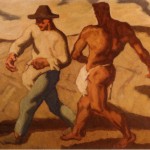 “Those who love me will keep my word, and my Father will love them, and we will come to them and make our home with them. Whoever does not love me does not keep my words; and the word that you hear is not mine, but is from the Father who sent me.”(John 14:23-24)
“Those who love me will keep my word, and my Father will love them, and we will come to them and make our home with them. Whoever does not love me does not keep my words; and the word that you hear is not mine, but is from the Father who sent me.”(John 14:23-24)
Jesus, according to John, said this. He said it after Easter and before Ascension, and he said it about himself, about God, and about the promised Spirit, the teacher who will abide with them.
In the week we read this, the English speaking world will mark the 400th anniversary of William Shakespeare’s death, and do so in part by acknowledging how his turns of phrase have become commonplace in our mouths. Even in the mouths of those who never read books, let alone plays, let alone Shakespeare’s plays. Shakespeare has shaped the language we speak, has formed our thinking and our values.
Here are just a few phrases Shakespeare coined that pop out of our mouths (thanks to BBC America for preparing this list):
“As luck would have it” — “As merry as the day is long” — “Waiting with bated breath” — “The be-all and end-all” — “Neither a borrower nor a lender be” — “Brave new world” — “Break the ice” — “Brevity is the soul of wit” — “Refuse to budge an inch” — “Cold comfort” — “Crack of doom” —“Dead as a doornail” — “Cry havoc and let slip the dogs of war” — “Devil incarnate” — “Eaten me out of house and home” — “Faint hearted” — “Fancy-free” — “Forever and a day” — “For goodness’ sake” — “Foregone conclusion” —“Full circle” — “The game is afoot” — “Give the devil his due” — “Good riddance” — “Jealousy is the green-eyed monster” — “Heart of gold” — “Hoist with his own petard” — “Ill wind which blows no man to good” — “In my heart of hearts” — “In my mind’s eye” — “Kill with kindness” — “Knock knock! Who’s there?” — “Laughing stock” —“Live long day” — “Love is blind” — “Milk of human kindness” — “More sinned against than sinning” — “One fell swoop” — “Play fast and loose” — “Set my teeth on edge” — “Wear my heart upon my sleeve” — “Wild-goose chase”
As I read these, I hear more than half of them falling from my mother’s tongue, my grandmothers’, too. And I would guess they never knew that these words came from Shakespeare. My own ignorance is also great: I thought Ben Franklin said the words, neither a borrower nor a lender be. I’d have bet money that more sinned against than sinning came from Dickens. Turns out, they took them from Will Shakespeare. And who knew Shakespeare invented the Knock Knock joke line?
Literally, then, we recognize in ourselves how Shakespeare is beloved because we keep his words. And, how his words come, not from him any longer, but from the spirit, the ethos, in which we who speak this language, are joined by it into a people who can communicate, and who hold certain values very, very dear.
O how the arguments rage, over Shakespeare’s faith, or lack of it, and was he Catholic or not. He pointed to his Muses, yet also pointed to the Spirit and its power. As Jesus pointed to his Father, saying his own words were not really his but came from God.
And surely there is holiness in this.
And even more surely, though we seldom like to recognize it, Jesus is telling us he is not about to soar into the unattainable ether and join a distant God, but will, in fact be still here, even in parting, joining God and entering us as our very breath, as values, stories, icons embedded in our hearts and minds, phrases for which he may no longer be credited, yet they are etched into us and powerful in our lives.
We may no longer sit in church pews, or read the Bible, or recite psalms, yet we still name our children for Jesus’ disciples, Peter, Andrew, John, James, Luke, Matthew, Mark, Nathaniel, Bartholomew, to name a very few, and for his mother Mary, and for Martha who fed everyone, and for the virtues they held up – Faith, Mercy, Grace, Hope, Patience. Jesus’ urging that we make love real in this world has raised hospitals, soup kitchens, counseling centers, foundling homes, schools and universities, and universal public education. All of this testifies to Christ’s presence, to the teaching work of the abiding Spirit, and to the continuing presence of God and Christ with us.
A wise friend, Todd Hearon, wrote this week, “I divide my thinking between a belief in immanence — maybe even something like panENtheism — and a despair that God would have anything to do with us, after what we’ve done to the planet and each other. But then I reconcile the two by thinking God-with-us, though we-without-God. “
And so this is where we are to seek, to turn in prayer, and to trust: to God-with-us, whose words are in our mouths, whose heart is in our hearts. The word is very near you, wrote the Deuteronomist, in your hearts and in your mouth, that you may keep this world, even when it seems to be without God, in holy love.
_____________________________________________________________________________________________
Image: Title page of the First Folio, 1623. Copper engraving of Shakespeare by Martin Droeshout. Taken from Wikipedia page for Shakespeare.
Phrases cited: From BBC America: 45 Everyday Phrases Coined by Shakespeare. Available online, with play citations for each phrase.










